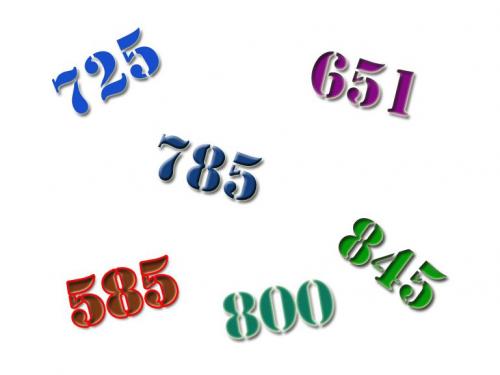
The bottom line to having a good credit score irregardless of whether it is an Experian, TransUnion, Equifax, FICO or Vantage score is - the more "bad credit" items that you have reported on your 3 credit bureau credit reports the lower your credit score will be on your FICO and or Vantage score. It is that simple.
The secret to achieving a good credit score is to be able to get any and or all of the bad credit items removed from each of the 3 credit bureau credit reports.
How Do They Calculate A Good Credit Score?
Your credit score is just a number representing your life as it relates to your past and existing debt. Each credit bureau, FICO and Vantage has it's own proprietary algorithm that they guard carefully but there is some general information available as to how they all calculate their score for you.
So How the Scores Are Calculated
Your credit score is calculated using five key "ingredients".
1) 35% of your Score is devoted to Payment History - missed payments, collections, bankruptcies etc. The older the information the less of an impact on your overall score.
2) 30% of your Score is based on Utilization - the amount of credit you have in use as compared to your available credit. The recommendations point to less than 10% of your available credit be utilized.
3) 15% of your Score is impacted by your Credit History - how long you've had accounts open and obviously takes some time to build.
4) 10% of your Score is based on Inquiries - if you apply for various forms of credit and then don't get that credit it will impact you negatively. Checking your own credit does not impact this number.
5) 10% of your Score is determined by Types of Credit - different forms of credit such as mortgages, auto loans, revolving credit and installments.
Whats a Good Credit Score?
The easy non-scientific answer is 760 or above. That's the score that is going to help you get the best interest rates possible on a mortgage, auto loan or many other forms of credit. Of course that doesn't mean that each lender will give you the same rate if you have a 760 score. It will depend upon the amount of money a particular lender has available at the time that you apply for your loan that will dictate what the loan rate they will offer you.
In the case where your credit score is 760 or more then I recommend that you pay attention to your credit scores and if it drops for some reason you will know immediately and you will be able to do what needs to be done to get it back to that magical number. This matters because if you allow it to drop within 30-60 days you'll see many of your loans and or credit card rates slide upward. That happens because the "fine print" on every loan or credit card agreement will usually allow the lender to adjust your rate without notice if your credit score changes.
If your credit score is far below the 760 score then you may want to find out how you can force all three of the credit bureaus to give you a good score. There are ways to do that visit free credit report to find out how.